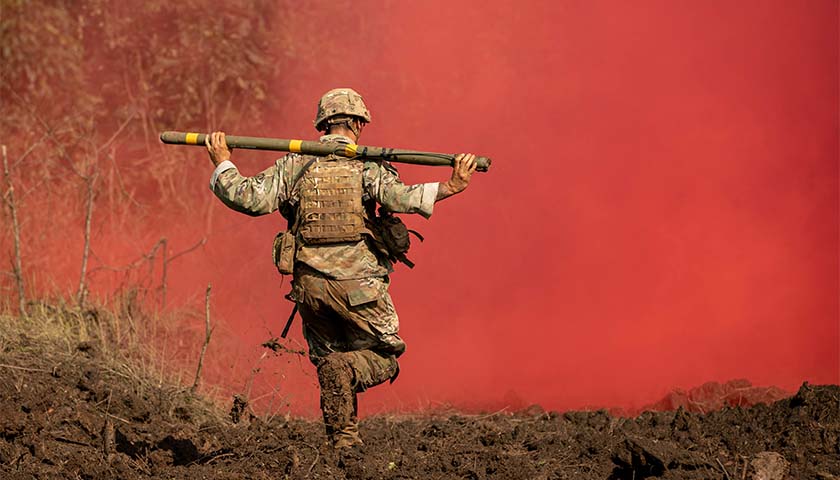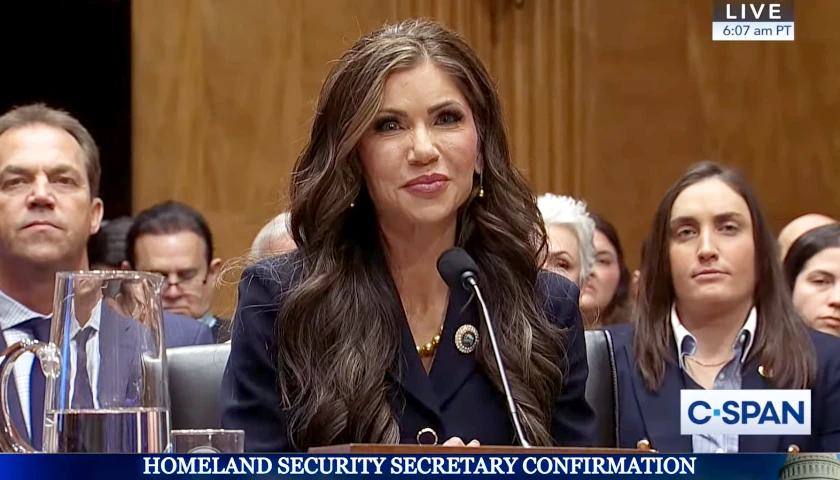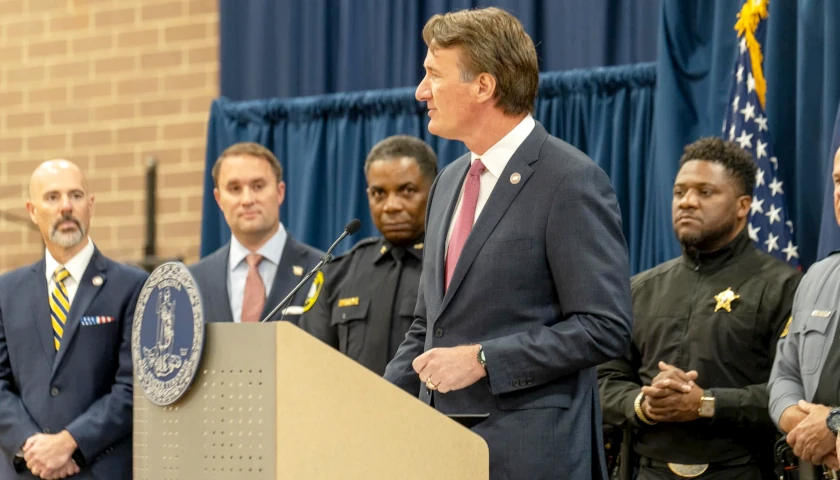by Victor Davis Hanson
The highest echelon of the U.S. military is becoming dysfunctional.
There are too many admirals and generals for the size of the current U.S. military. It now boasts three times the number of four-star admirals and generals than we had during World War II—when the country was in an existential war for survival and when, by 1945, our active military personnel was almost nine times larger than the current armed forces.
Somehow a gradual drift in the agendas of our military leadership has resulted in too many various emphases on domestic cultural, social, and political issues. And naturally, as a result, there is less attention given to winning wars and leveraging such victories to our nation’s strategic advantage.
The consequences of these failures are downright scary for a world superpower upon which millions at home and billions worldwide depend.
There are too many concurrent Pentagon crises. Any one of them would be dangerous to our national security. Together they imperil our very freedoms and security.
Reform?
What is to be done? The Uniform Code of Military Justice must be enforced, and not selectively applied on the basis of rank: officers below the rank of general and admiral now face severe penalties for disparaging in personal terms the current administration, while one stars and above are given de facto exemptions for comments about the previous administration. If the code is not considered law but merely a recommendation, then it should be scrapped.
The Department of Defense Office of Inspector General and the inspector generals of the various branches of the military must enforce existing laws that carefully define the limits of the Joint Chiefs of Staff activity. And they must punish those officers who violate such statues to interrupt the legal chain of command.
There must be a cooling off period to prevent retiring military officers from rotating onto the boards and lobbying teams of corporate defense contractors, with the presumption that their knowledge of the operation of the Pentagon can be monetized to the advantage of particular corporations. Five years seems a reasonable period in which our top brass should refrain from joining firms that are seeking lucrative contracts from the Pentagon.
Any former high-ranking retired officer who is paid to provide military commentary on news channels should not enjoy security clearances. The practice is currently much abused. A good example was the case of retired General James Clapper. For months, he went on television, with presumptions of superior wisdom, supposedly based on his access to confidential intelligence, and flat out deceived the American people about the so-called Russian collusion hoax and the supposed treasonous nature of the president.
We are currently witnessing several scandals in the Department of Justice, the IRS, the CIA, and the FBI by careerist, unelected employees. But far more chilling is the crisis in the U.S. military upon which we all must depend. Its revered history and accomplishment must somehow remain a source of pride and inspiration to guide all of us in these frightening times ahead.
So, What Happened to the Joint Chiefs?
First, the Joint Chiefs have now gone astray. Laws passed in 1947, 1952, and 1986 explicitly defined—and incrementally but steadily narrowed—the mission of the JCS. The Chair may be the nation’s highest iconic ranking military officer. But his actual operational control over the military is carefully delineated by law and quite limited by design.
In sum, the JCS is an advisory body. Members are made up of four-star officers of their respective branches of the military. But by statute they are not responsible for carrying out orders from the president as relayed through the Secretary of Defense.
Instead, these highest-ranking officers of the various services, led by a chairman, are to present various options during times of policy debate, consultation, and crisis.
Nothing could be clearer about such an important though advisory role. Yet the present chairman, General Mark Milley, if media accounts are accurate, has apparently violated both the spirit and letter of the law. He reportedly called together top officers of the military services and ordered them to reroute long-held protocols in reference to the nuclear defense of the United States in times of peril—and to channel such operational decision-making through himself.
That clear and dangerous usurpation of power is certainly contrary to the law—no matter what his fellow officer corps defenders plead. It is entirely irrelevant whether Milley acted in good faith, or was swayed by the emotions of the time, political and media pressures, or his own outsized ego. His job is to stay cool and offer calm advice strictly within the letter of the law. And he failed on that critical account.
Milley additionally contacted his Chinese Communist military counterparts to inform them that he so believed that his own country was in a state of crisis—perhaps after a conversation with the speaker of the House and de facto head of the opposition party in the Congress. Further, in freelancing fashion, he apparently promised to warn the Chinese in advance should his own country undertake any aggressive action against Beijing.
Such an act is certainly unprecedented in U.S. military history. And if de facto such acts were to be institutionalized, then the chairman of the Joint Chiefs, with impunity, could ignore the law and place the operation of the military in his own hands, on grounds of his own hunches about the current wisdom or stability of his commander-in-chief. Freelancing psychiatry is not in the job description of the Chairman.
Milley at the time claimed—and later denied—that he feared in late 2020 that Donald Trump, one of the rare presidents to have eschewed optional wars and preemptive attacks, might be too trigger happy to entrust with his constitutional appointed powers under the Constitution as an elected president.
Aside from the fact that the Constitution has ample remedies for such a scenario—from conviction of an impeachment indictment in the Senate to removal under the 25th Amendment—that is an absurd excuse for a veritable coup.
In truth, Trump took an enormous amount of criticism from the current and active officer corps for eschewing a retaliatory strike against Iran, and for choosing not to insert American troops into a volatile standoff between Kurdish troops and the forces of NATO ally Turkey in Syria. Trump is the first president in memory not to have ordered a new major military campaign during his tenure.
Would Milley have acted in such fashion had House Minority leader Representative Kevin McCarthy (R-Calif.) called him, warned him that Joe Biden was dangerously non compos mentis, and then expressed worry that the president’s cognitive disability threatened the entire 20-year effort in Afghanistan, and thus demanded action by Milley to short-circuit the chain of command?
The civilian-military tradition of U.S. national security cannot survive a Joint Chiefs chairman who informs Washington journalists that he believes his commander-in-chief exhibits Hitlerian characteristics, appropriates power from the elected president, violates the chain of command, freelances in foreign policy with a foreign and hostile military, and communicates directly to take such action with the opposition leader speaker of the House—after circumventing an elected president. Whether he knows it or not, Milley’s resignation is not a matter of if, but only of when. If Milley were not to resign, then we essentially have no civilian control over the military, and his dereliction will be a green light to other would-be usurpers of rights denied the Joint Chiefs of Staff by law.
A Uniform Code of Military Whatever?
Second, the once hallowed Uniform Code of Military Justice is now a mere construct. It is widely ignored to the point of parody—at least for officers above the rank of colonel who violate Article 88’s prohibition of using “contemptuous words against the President.”
Remember the statute was aimed at forestalling military officers condemning unpopular or controversial presidents, not beloved leaders—in the manner that the First Amendment protects heterodox, not orthodox, expression. That obvious fact was totally lost in the mob-like rush to vilify the president by an entire cadre of four-star retired generals and admirals in 2020-21.
Indeed, for the last four years, the nation’s most decorated retired officers have consistently attacked their commander-in-chief in the most personal and venomous invectives that make General Douglas MacArthur’s ridicule of the unpopular Truman Administration look tame in comparison. The only precedent after the adoption of the UCMJ for such slurs is the checkered career of General Edwin Walker (he had earlier called President Truman “pink”). Under pressure, Walker was the only general to have resigned his commission, left the army, and reentered civilian life in the 20th century.
The recent spate of public disparagement has been truly as astonishing as it was frightening. Our esteemed retired officer corps have variously called a president a Mussolini-like character, a liar, crazy, Nazi-like, comparing his border policy to the death camps at Birkenau-Auschwitz. Milley himself was said to have compared his commander-in-chief to insider journalists to the Nazis under Adolf Hitler. A retired four-star general, Michael Hayden, just retweeted a crazy suggestion to deport any unvaccinated supporters of the former president to Afghanistan with one-way tickets—a jest perhaps, but one implying a death sentence as well.
And all this is not mere rhetoric, but an amplification of insurrectionary prompts without precedent in recent history. Former Defense Department officials such as Rosa Brooks, in print, had raised the issue of military intervention in the first weeks of the Trump Administration by suggesting that the military might have to stage a coup to expel him from office.
Admiral William H. McRaven wrote an op-ed in which he attacked the president in terms clearly in violation of UCMJ. He stated, just months before a scheduled election, that Trump should be removed from office: “[I]t is time for a new person in the Oval Office—Republican, Democrat or independent—the sooner, the better. The fate of our Republic depends upon it.”
Since when in an election year does a retired admiral determine that a president should be removed apparently “sooner”? And is it reckless for such an esteemed officer to advocate such action when many of his former subordinates still serve in the military?
Two retired officers in late 2020 urged Chairman Milley to use force if necessary to remove Donald Trump from office if he felt that Trump had improperly questioned the election results and might not leave office on January 20, despite there being no evidence that Trump ever even considered such a step. When did military officers assume the roles of psychiatrists, professors, constitutional lawyers, inspector generals, and clergy?
The legacy of our retired top brass is that now military officers feel they can appeal to their own sense of justice rather than fealty to the law to consider either removing an elected president or to so damage him by slurs and smears they render him ineffective. For all their talk of the Constitution, the law, and the republic, they have shown that they regard the UCMJ simply as a mere construct to be ignored.
Social Justice Warriors
Third, this selective politicization of the military has now reached dangerous levels. After various officers wrote vociferously about the dangers of using military troops to restore order during 120-days of continuous rioting, violence, and arson during the summer 2020, they went absolutely quiet when Joe Biden ordered tens of thousands of federal troops, barriers, and barbed wire to militarize Washington, D.C. in winter 2021—the greatest militarization of our nation’s capital since the Civil War.
The retired officer corps apparently were entirely ignorant of the long history of presidents employing troops to restore order when police seemed overwhelmed. That was an odd amnesia given that former Chairman of the Joint Chiefs Colin Powell once made it clear to then President George H. W. Bush that he was happy to send in the Marines to Los Angeles during the Rodney King riots. And he did so with Biden-like “dispatch.”
Note that former members of the Joint Chiefs blasted Trump for a purported photo-op in conjunction with a supposed order to use military personnel to clear Lafayette square with tear gas. Yet their melodramatic public outrage was based on a media-concocted lie, as revealed by a later careful investigation by the inspector general of the Department of the Interior.
Yet the untruth was never corrected by any of the retired generals who whipped it up in June 2020 and did their own part to fan a national hysteria.
As a result, in June 2020 Joe Biden boasted that former top-ranking generals would help to remove Trump from office if he contested the election: “I’m absolutely convinced they will escort him from the White House with great dispatch.” One wonders what would have happened had Trump boasted that if Biden should not accept a contested verdict of a 2020 defeat, the military would prevent him from entering the White House?
Former chairman of the Joint Chiefs, Mike Mullen, claimed that Trump was essentially treasonous by giving aid to our enemies by his actions. “[He] gave succor to the leaders of other countries who take comfort in our domestic strife,” Mullen said. Note that the same General Mullen defended the Milley call to the communist Chinese military leadership.
Former four-star General James Clapper called Donald Trump a veritable traitor (a “Russian asset”), despite the failure of the 22-month, $40 million Mueller investigation to find any truth in the Russian collusion hoax.
Again, none of these officers offered corrections following either the inspector general’s report of the June 2020 violence or the end of the Mueller investigation.
Too many of our officers, retired and active, lecture the country on controversial issues from “white rage” to the need for women in front-line combat units to transgender policies. Thereby, the Pentagon has cultivated and won the support of the politicos traditionally deeply suspicious of the U.S. military. In such a novel quid pro quo understanding, the Left has gone strangely quiet as retired military officers revolve into defense contractor boards and as weapons procurement lobbyists.
Victory or What?
Four, these types of politicization and violation of a variety of laws do come at a price, either in distracting the military command from its primary mission of defeating the enemy and securing victory in American conflicts or contextualizing such failure through embrace of social activism.
Since the Korean War, and with the exception of the first Gulf War, the military’s record has not been especially stellar, given a chronic inability to achieve a military victory in a cost-benefit sense acceptable to the American people: optional interventions in Lebanon, Somalia, and Libya, the defeat in and retreat from the Afghanistan war, and strategic stalemate and withdrawal from Iraq.
Many of these setbacks were due to political loss of will, but the military might have prevented such fickle and fluid civilian policies had it been able to present a strategy for victory, one that justified to the American people the resulting costs in blood and treasure.
The above pessimistic appraisal is not mine nor conservatives. It is now likely the consensus of our enemies from Afghanistan to Russia to Iran and other parts of the Middle East to North Korea. Our enemies hope that the once most powerful military in the history of civilization is going through a sort of people’s liberation army internal revolution, one in which ideological purity, not battlefield competence, is deemed the better measurement of today’s high-ranking officer corps.
How strange that in the midst of a humiliating defeat and withdrawal from Afghanistan our military still assured us that culturally sensitive food was awaiting refugees upon landing in the United States—a group, we were told, flown out with acceptable gender ratios and unvaccinated, but shepherded by soldiers who will shortly be discharged if they likewise remain unvaccinated.
– – –
Victor Davis Hanson is a distinguished fellow of the Center for American Greatness and the Martin and Illie Anderson Senior Fellow at Stanford University’s Hoover Institution. He is an American military historian, columnist, a former classics professor, and scholar of ancient warfare. He has been a visiting professor at Hillsdale College since 2004. Hanson was awarded the National Humanities Medal in 2007 by President George W. Bush. Hanson is also a farmer (growing raisin grapes on a family farm in Selma, California) and a critic of social trends related to farming and agrarianism. He is the author most recently of The Second World Wars: How the First Global Conflict Was Fought and Won, The Case for Trump and the newly released The Dying Citizen.
Photo “Smoky Training” by U.S. Army CC BY 2.0.




